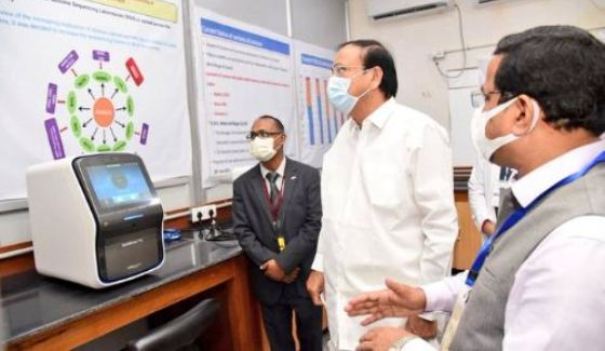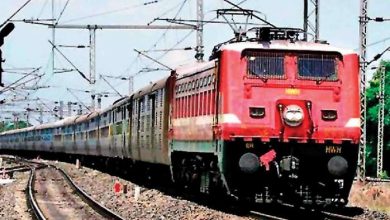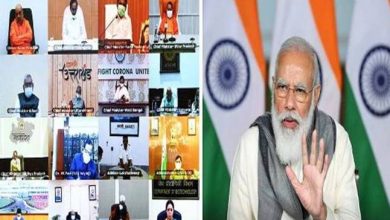India’s development is incomplete without development of North Eastern Region: Vice President

The Vice President, Shri M. Venkaiah Naidu today praised the contribution of the Indian scientific community in nation building and said that the future progress of our country rests in the hands of our able scientists. He also urged the researchers and scientists to work shoulder to shoulder along with other important groups to make India a Vishwaguru once again.
Addressing the gathering at a the national Seminar on ‘Bioeconomy from Bioresources of North Eastern Region of India’ organized by the Institute of Bioresources and Sustainable Development (IBSD) in Imphal today, the Vice President opined that rational thinking and scientific temper are the cornerstones of a progressive nation. “You are endowed with the requisite education, training, focus and discipline to apply pragmatic scientific knowledge for fast-tracking the country’s all-round development,” he said to the scientists present.
Stressing that India’s development is incomplete without development of the North Eastern Region, the Vice President said that the Central Government has been according priority to the North East by adopting a multi dimensional approach for the all round development of the region. He urged all states to work along with the Center in the true spirit of Team India for growth and prosperity. Reiterating that peace is prerequisite to progress, he said that there can not be any compromise on the unity and integrity of the nation.
Emphasising the need for transparency and corruption free governance, Shri Naidu said that funds meant for the poor should reach them without any diversion or dilution. Stressing the importance of using mother tongue in administration, he called for providing information on development schemes to villagers in local language.
On this occasion, the Vice President inaugurated the Phyto-pharmaceutical Lab Facility at Institute of Bioresources and Sustainable Development (IBSD). Observing that the North-Eastern region is a biodiversity Hotspot with its rich variety of ecosystems, Shri Naidu praised IBSD for managing the bioresources of the region for sustainable development using modern biotechnological tools.
He also expressed his happiness that ISBD, an institution under the Department of Biotechnology (DBT) is promoting the Phyto-pharmaceutical Mission of North- Eastern Region. The Mission that aims to promote the documentation, scientific validation and evaluation of traditional healthcare practices is an important step and assumes special significance in the context of the vast plant resources and diverse traditional healthcare practices of the North-East. “I am glad to know that ISBD is also focusing on the promotion of start-ups based on the development of herbal medicinal products such as AYUSH drugs, Phyto-pharmaceuticals and nutraceuticals, among others. This is indeed the need of the hour,” he said.
Noting that the Phyto-pharmaceutical Mission will focus mainly on therapeutic areas like antiviral, anti-bacterial, anti-fungal and insect repellents, the Vice President opined that this would help in popularizing traditional healthcare practices and would also aid in the development of effective alternative herbal medicines to combat diseases like Covid-19. “I am certain that the move to target high quality volatile oil producing plants under this programme will attract more farmers to commercial cultivation of aromatic plants of this region,” he added.
The Vice President exuded confidence that transformational approaches in developing products, processes and technologies with local bioresources will help in development of traditional knowledge-based therapeutic agents leading to the socio-economic development of the region as well as benefits to traditional health care practitioners. He also appreciated IBSD’s initiatives in ensuring quality standards of food and water in the North Eastern Region.
On this occasion, the Vice President also visited the recently established Indian SARS-CoV-2 Genomics Consortium (INSACOG) facility at the Institute. Praising IBSD’s role in combating the challenge of the Covid-19 pandemic, Shri Naidu called the INSACOG network as an important marker in this direction. It may be noted that through this network, the entire genome sequencing of SARS-CoV-2 virus across the nation can be tracked aiding our understanding of how the virus spreads and evolves. Complimenting IBSD for its sterling efforts to sequence the SARS CoV 2 positive samples, the Vice President said that this sequencing laboratory within Manipur is a big leap in our collective fight against the novel coronavirus. He congratulated Prof. Pulok Kumar Mukherjee, Director of IBSD for his efforts in this regard.
Shri Naidu also appreciated IBSD’s numerous outreach programmes to ensure that the fruits of its research reach the common people of this region.
In his address, the Vice President advised the Manipur government to focus on important areas like health, education, agriculture, communication and connectivity to accelerate development in the region. He also asked the state to encourage and the youth to take up different sports.
The Governor of Manipur, Shri La. Ganesan, Chief Minister of Manipur, Shri N. Biren Singh, Chief Secretary of Manipur, Dr Rajesh Kumar, Director, IBSD, Prof. Pulok Kumar Mukherjee, scientists and staff of IBSD attended the event.
Following is the full text of speech –
“I am extremely delighted to be here in Imphal at the Institute of Bioresources and Sustainable Development (IBSD). I am told that this is the only Institute under the Department of Biotechnology, Ministry of Science and Technology, Govt. of India, located in the North-Eastern Region of the country here in Manipur. As we know, the North-East is unique in many ways—in terms of cultural richness, geographical grandeur and linguistic diversity. Importantly, the North-Eastern region also has the critical Indo-Burma biodiversity Hotspot with its rich variety of ecosystems. The exceptional work you are doing through scientific management of the bioresources in the Indian region falling within this biodiversity Hotspot as the focus of your research activities, is truly commendable. Coupled with this, the numerous outreach programmes in this regard serve to fulfil the mission objectives of this Institute.
Sisters and Brothers,
I learn that this Institute is not only serving the people of Manipur but also has three other entities including its Regional Centre at Gangtok in Sikkim and Research Nodes at Shillong in Meghalaya and at Aizawl in Mizoram.
I would like to record my appreciation while congratulating all of you for managing the bioresources of this region for sustainable development using modern biotechnological tools. I am pleased to note that the Department of Biotechnology (DBT) is promoting the Phyto-pharmaceutical Mission of North- Eastern Region.
I am also happy to inaugurate the “Phyto-pharmaceutical Lab Facility” today.
IBSD’s initiative to establish the Phyto-pharmaceutical Mission to promote the documentation, scientific validation and evaluation of traditional healthcare practices is an important step indeed. This enterprise assumes special significance in the context of the vast plant resources and diverse traditional healthcare practices of the North-East, based on the rich bioresources of the region.
I am told that this unique initiative includes the ethno-botany and ethno-pharmacological perspectives of medicinal plants including their cultivation, promotion, value addition and chemical profiling. I am glad to know that you are also focusing on the promotion of start-ups based on the development of herbal medicinal products such as AYUSH drugs, Phyto-pharmaceuticals and nutraceuticals, among others. This is indeed the need of the hour and is in line with Prime Minister Shri Narendra Modi’s vision for an Atmanirbhar Bharat.
An interesting dimension of this Phyto-pharmaceutical Mission is that its main focus is on therapeutic areas like anti-viral, anti-bacterial, anti-fungal and insect repellents. I am pleased to note that other thrust areas which are a part of this Mission include diabetes, arthritis, bronchial asthma, gastro-protectives and immuno-modulation. I am certain that the move to target high quality volatile oil producing plants under this programme will attract more farmers to commercial cultivation of aromatic plants of this region. Moreover, this would also help in popularizing traditional healthcare practices. Further, it will aid the development of effective alternative herbal medicines to combat virulent infectious diseases like Covid-19, which the world is battling today.
I am glad to know that various medicinal plants which are unique to this region are targeted under the Mission for their documentation, extraction, isolation, characterization, value-addition and development of marker compounds, among other things.
The studies being carried out by this Institute focusing on a range of medicinal plants with potential therapeutic effects for establishing their mechanism of action with network pharmacology and synergistic study, mark a significant step forward. I am sure that this research will lead to different transformational approaches in developing products, processes and technologies with local bioresources. This will have a cascading effect in positive terms. It will also help in the development of traditional knowledge-based therapeutic agents leading to the socio-economic development of the region as well as benefits to traditional health care practitioners.
I am told that research is being conducted here in multiple areas of bioresources. I am happy that IBSD has been working in the area of Antimicrobial resistance (AMR) which has local relevance and global importance—a principle which I always emphasise. I also learn that IBSD is working on quality evaluation, validation of fermented foods of NER for developing products, processes and technologies; quality management and surveillance of water through testing, and technological interventions for drinking water, among others. These are much-needed initiatives which will provide long-term benefits to people of the North-Eastern Region. I congratulate all of you—the Director, scientists and scholars at IBSD for the noteworthy contributions made by you on these natural resources.
Brothers and sisters,
Scientists constitute an essential core of human resources needed to power India’s march into a rosier tomorrow. The future of this great nation rests in the hands of the community of scientists, who must work shoulder to shoulder along with other important groups. You are endowed with the requisite education, training, focus and discipline to apply pragmatic scientific knowledge for fast-tracking the country’s all-round development. The distilled knowledge and scientific temper you possess are the cornerstones of a progressive nation. As researchers who learn constantly at the altar of science, and view things dispassionately through the prism of neutrality, you are graced with the vision to turn India into a Vishwaguru once again.
I must mention the fact that the IBSD’s role in combating the challenge of the Covid-19 pandemic is truly praiseworthy. The recently established Indian SARS-CoV-2 Genomics Consortium (INSACOG) facility at the Institute, is an important marker in this direction. I am told that through this network, the entire genome sequencing of SARS-CoV-2 virus across the nation can be tracked. This, in turn, aids our understanding of how the virus spreads and evolves, while marking any changes or mutations to the genetic code. I would like to compliment IBSD for its sterling efforts to sequence the SARS CoV 2 positive samples for not only Manipur state but also for other states of our North-Eastern Region. The sequencing laboratory within Manipur is without doubt a big leap in our collective fight and understanding of the novel coronavirus that has impacted millions of lives and livelihoods globally. My congratulations to Prof. Pulok Kumar Mukherjee, Director of IBSD for his efforts in translating this dream into a living reality.
I am pleased to note that IBSD is involved in a number of outreach activities to ensure that the fruits of its research reach the common people of this region. To commemorate 75 years of Independence, I am told that IBSD based on Jan-Bhagidari, has set up a ‘Science Museum’ in ‘Aspirational’ Chandel District of Manipur, which is an excellent example of one such endeavour.
I once again extend my compliments to the Director and all scientists, researchers and staff of IBSD for their dedication and hard work. I wish all of you every success in your research activities and other endeavours.


